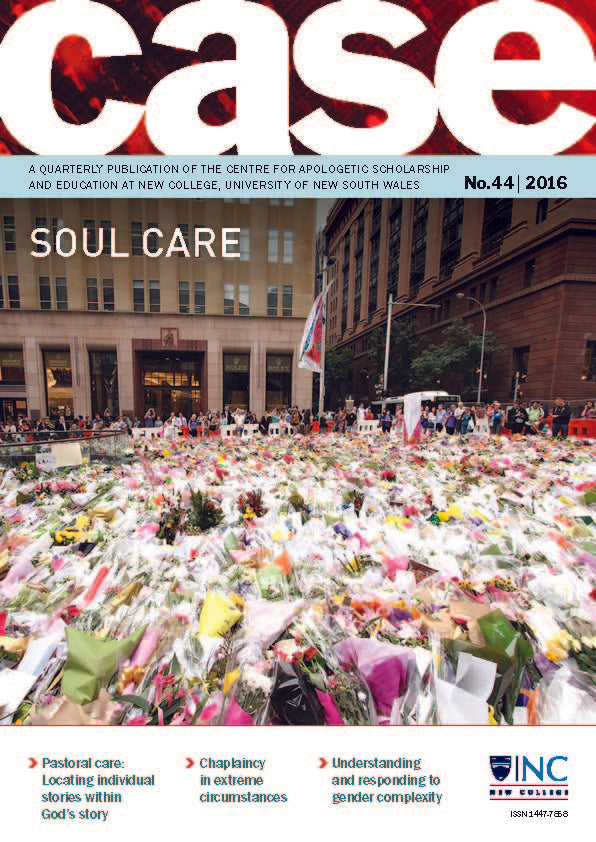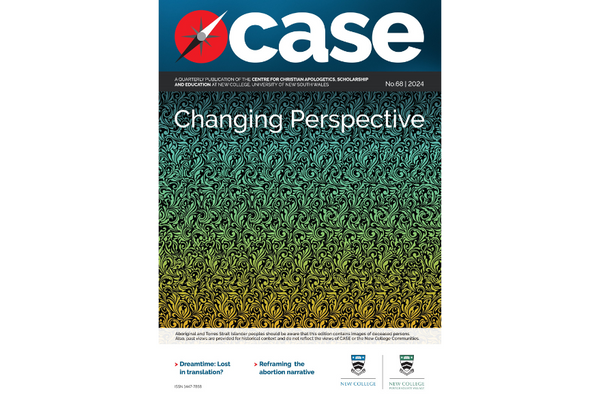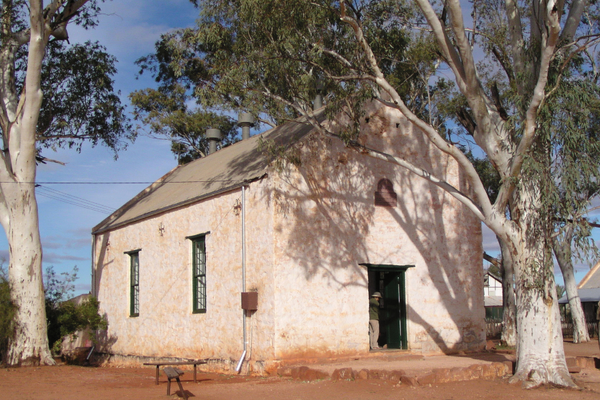Soul Care: Introduction

Trevor Cairney
There are no ordinary people. You have never talked to a mere mortal. Nations, cultures, arts, civilizations - these are mortals and their life is to ours as the life of a gnat. But it is immortals whom we joke with, work with, marry, snub and exploit. (1)
These famous words of C.S Lewis are a sobering reminder of the tremend-ous importance of the work done by chaplains and pastoral carers. Students, parishioners, patients, addicts and inmates are not mere bundles of flesh and bone who appear for a short time and then vanish. Like all of us, such people are made in the image of God with the potential to share his glory - or distort it horribly - for eternity.
This issue of Case Quarterly takes a closer look at the kind of 'soul care' chaplains and other pastoral carers undertake. Many of the articles in this issue were first presented at the CASE/Anglicare Powerful Words Conference in 2015. The two pieces by Dr Rhys Bezzant are taken from his keynote speech. The first reveals the resources to be found in the words of Scripture, and the Psalms in particular. He discusses how Scripture 'speaks' to those receiving care, and helps them to see their situation from God's perspective. The other looks at the history of one-to-one ministry, and in particular its place in the Protestant Reformation, and its implications for pastoral care today.
Kate Bradford has worked first hand as a chaplain in paediatric hospitals, and now also trains chaplains. Here she examines the pastoral care offered by Job's friends in the Bible, finds it wanting, and shares her expertise on how they could have done a better job!
In this issue, several chaplains also share stories of their work on the ground - in prisons, hospitals, a residential college, and even during the Lindt Cafe siege. These accounts reveal the amazing opportunities chaplaincy opens up. Pastoral care often takes place in contexts of stress, sickness, grief, suffering or trauma. Those in need of care are frequently at a crossroad and it is unclear which path they should choose, or which will be allotted to them. The ordinary distractions and busyness of life are often stripped away at these times, and people are left faced with the huge questions of life: What is my place in the world? What is there beyond it? Where is God? Does he care? The job of a chaplain is to listen, to be there when others aren't or can't be, to show God's love and comfort, and the hope he offers.
The overall aims of pastoral care do not change, but different situations require pastors to have different knowledge and skills. It will help a prison chaplain to understand legal processes and the prison systems; it will help the mental health chaplain to know how different psychological disorders manifest, and what help is available. In this edition, we consider gender complexity. It is an issue that is currently in the spotlight, and one which Christians - particularly those involved in pastoral care and public discourse - need to understand. Patricia and Kamal Weerakoon address this sensitive issue in two articles. The first, 'Understanding gender complexity', lays out what gender complexity is, explains the various terms used, draws on recent research, and shows how it is to be understood within a biblical framework.
With this background in view the second article 'Responding to gender complexity' offers a Christian approach to helping people suffering from gender uncertainty, explaining the options available. These articles are important for improving the understanding of the Christian community in general, and invaluable for pastors and lay people who minister to those who struggle with gender identity.
As Lewis observed, there are 'no ordinary people'. Every person we come across - be they joyous or grief-stricken, healthy, ill or dying, free or incarcerated, established or just setting out in life, wealthy or poor - each one:
may one day be a creature which, if you saw it now, you would be strongly tempted to worship, or else a horror and a corruption such as you now meet, if at all, only in a nightmare. All day long we are, in some degree helping each other to one or the other of these destinations. (2)
We hope this issue encourages you to be intentional as you interact with your fellow immortals, listening and caring for them as opportunities arise, and directing them to a glorious destination.
Endnotes
1.) C.S.Lewis The Weight of Glory p9 www.verber.com/mark/xian/weight-of-glory.pdf (accessed April 2016)
2.) Ibid
Leave a comment
Comments will be approved before showing up.



